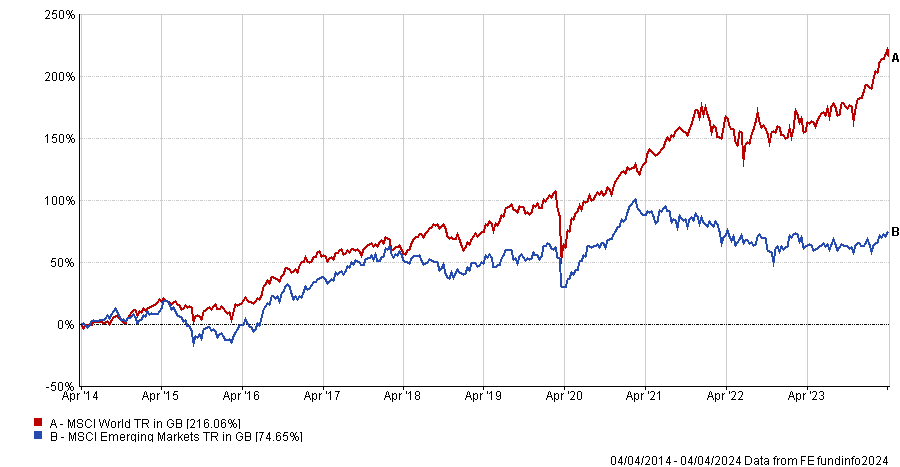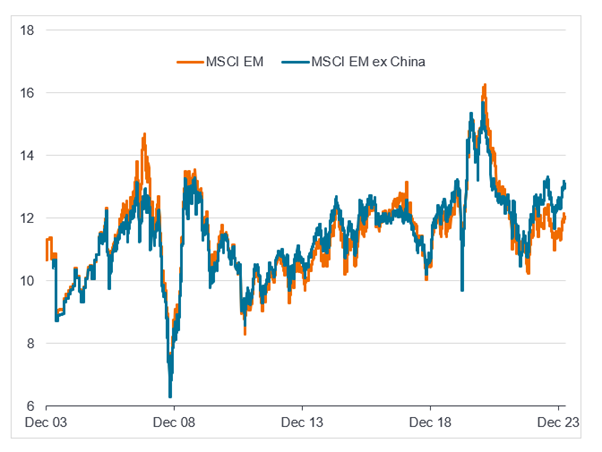The multi-asset teams at Liontrust Asset Management, Invesco and Legal & General Investment Management have all gone overweight emerging market equities.
After a period of relative underperformance, emerging market equities are now so cheap that this constitutes a buying opportunity, they believe. Moreover, emerging markets are set to benefit from accommodative monetary policy and a resilient global economy. Below Trustnet looks at the main reasons for their optimism.
Attractive valuations
James Klempster, deputy head of multi-asset at Liontrust, said emerging market are “trading at levels that historically, in pretty much any equity market, have been a rewarding long-term entry point.”
Emerging markets have lagged developed markets for the past decade but the divergence in performance has been especially stark since Covid, as China entered an extended lockdown and then struggled to rebound.
Performance of emerging vs developed markets over 10yrs

Source: FE Analytics
One exception is India, where valuations have ridden up, although some market participants argue that India is a quality play and deserves to be expensive, Klempster noted. Given that emerging market equities including India are, as whole, attractively valued, then without India the other markets look exceptionally cheap.
Accommodative monetary policy and other tailwinds
Meanwhile, the potential for financial conditions to loosen in both emerging and developed markets is a significant tailwind, said David Aujla, lead manager of Invesco’s risk-targeted Summit Growth portfolios.
“Some emerging market central banks have already started to cut rates, while in the US, it is highly likely that monetary policy will be eased over our tactical timeframe of one to three years,” he noted.
“Interestingly, the past few US interest rate peaks have typically seen the outperformance of emerging equities over the following 12 to 24 months. The US dollar, which when weaker or weakening, can be a help for emerging markets.”
Klempster added that emerging markets are correlated to the global economy, which is “in a reasonable shape”, and to global trade, consumption and demand, which should receive a boost from monetary loosening. “The reason we are positive on emerging markets is we’re positive on the global economy,” he concluded.
Myriad themes are likely to favour the different countries and regions within emerging markets, Aujla continued. “India is expected to benefit from positive demographic trends while certain economies in Latin America, such as Brazil and Mexico, should continue to benefit from nearshoring trends and an increase in foreign direct investment.
“North Asia on the other hand seems well positioned to capitalise from the rush to artificial intelligence, with a large part of the technology supply chain residing in South Korea and Taiwan.”
China – the fly in the ointment
Being bullish on emerging markets is by no means a consensus trade. Scopic Research, which tracks sentiment amongst multi-asset managers, reported in March that several firms were forecasting a negative return from emerging market equities in the next 12 months, including Janus Henderson Investors, abdrn and Royal London Asset Management. However, that data might be clouded by bearishness over China, which has struggled to regain its form post-Covid and had many issues surrounding its property and private equity sectors.
As Klempster said: “The ambivalent sentiment – I think it might be worse than ambivalent –ultimately stems from China. We think of it as similar to the UK in the sense that you’d struggle to find anyone who will give you a positive narrative about the economy and the market.”
He argued that bearishness on the Chinese economy should not be allowed to cloud the investment thesis as the macro story “is not the same as an investment case”.
“Clearly there are relationships between an economy and the stock market, but especially with large-cap stocks, it is a fairly loose connection. That’s the point we made when the game was very good for China and it’d be remiss of us to stop making it now,” he explained.
Oliver Blackbourn, a portfolio manager in Janus Henderson Investors’ multi-asset team, disagreed. Forward valuations for emerging markets outside of China are in the top quartile relative to the past 20 years, he said. Earnings in emerging markets still look quite depressed, but earnings growth would feed through into improved performance, he added.
12-month forward price-to-earnings ratio of emerging market equities

Sources: LSEG Datastream, Janus Henderson Investors, as at 9 Apr 2024
China, meanwhile, has become somewhat disconnected to the rest of the emerging markets. “There is potential for some big upside in China if the government adjusts its policy settings to become more wholehearted in its stimulus. So far, we've generally seen smaller tweaks rather than the sort of broad-scale stimulus that people want to really change that outlook,” Blackbourn observed.
“But in the meantime, China also has the potential go nowhere because it has structural problems, especially the over-indebted property sector.”
Another threat for emerging markets would be if the US Federal Reserve adopted a higher for longer policy, he added.
Nonetheless, Blackbourn is more positive on emerging markets outside of China. “We are seeing an improving cyclical outlook [globally], a bottoming out in the manufacturing cycle and a bit of an upturn. It's a little bit noisy at the moment, but we think we're going to see that continue and that's going to benefit more cyclical areas. Emerging markets outside of China look quite cyclical along with Europe, so we think both of those could do reasonably well going forward.”
Implementation and manager selection
In terms of practical implementation, Klempster prefers active managers for emerging markets due to the plethora of idiosyncratic risks and the differences between regions and politics.
Liontrust’s multi-asset portfolios combine Vontobel Sustainable Emerging Market Leaders with BlackRock Emerging Markets to achieve multi-factor exposure. “For us, its always about the blend, it’s never about the individual manager,” he explained.
Vontobel focuses on quality, return on invested capital and profitability, while BlackRock provides core exposure and does not have large biases.





